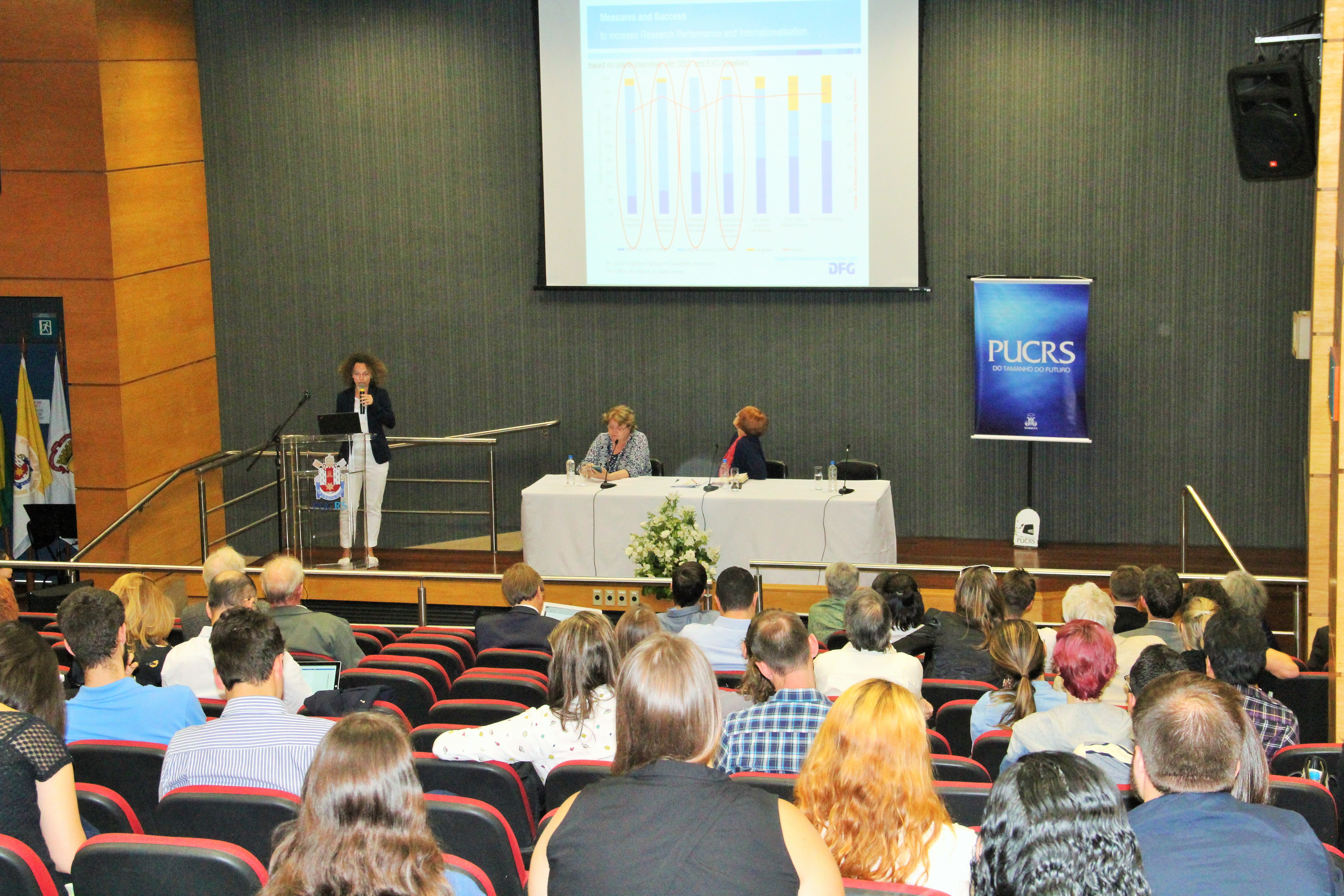DFG and Capes Present Internationalisation Strategies in Porto Alegre
Representatives of both funding institutions took part in the 8th German-Brazilian Sustainability Symposium in Porto Alegre
(24.10.17) The eighth “German-Brazilian Symposium for Sustainable Development” was held from 2 to 7 October at the Catholic Papal University in the Federal State of Rio Grande do Sul (PUCRS) in Porto Alegre. Around 250 researchers from both countries took part in the event, which takes place alternately in Brazil and Germany. It is supported by the Baden-Württemberg Brazil Centre of the University of Tübingen, and (from 2011) by Baden-Württemberg International (bw-i).

Dra. Kathrin Winkler, diretora do Escritório da DFG para América Latina, participou do evento
© DFG
In view of the established German-Brazilian projects in the area of sustainability, the Director of the DFG Latin America office, Dr. Kathrin Winkler, was invited to speak about the current status of scientific collaboration between Germany and Brazil and ongoing joint initiatives with Brazilian partner organisations.
“We are seeing an upwards trend in cooperation between researchers from Brazil and Germany. Despite the difficult situation at present for science and the humanities here in Brazil, the number of German-Brazilian publications has increased greatly over recent years and is above the average in comparison with other Latin American countries,” she said. From 2009 to May 2017 around 233 bilateral projects were funded by the DFG, totalling over €42 million. Winkler attributes this increase to productive cooperation with the Brazilian funding agencies at the federal level as well as in the federal states.
She also outlined the measures that have been introduced in Germany towards stronger internationalisation of science and the humanities. This includes strategies for recruiting researchers from abroad, for example as part of the Federal and State Governments’ German Excellence Initiative, which played a very significant role in increasing the competitiveness of the German research landscape.
International cooperation and engagement are not only a requirement for sustainable development, but also constitute an important component of scientific excellence, as Concepta Pimentel, Director of International Relations at Capes, emphasised. The Capes funding agency has been a partner organisation of the DFG at the Federal level since 2005.
Pimentel outlined the strategies for strengthening international cooperation in Brazil and also talked in more detail about the current challenges in the country. These include a deterioration in the position of Brazilian universities in international rankings and their low number of international students, the low impact of publications in Brazil, the small number of current and pending patents and also a declining global innovation index. She said that, furthermore, Brazilian researchers were seldom involved in international research projects. “Our universities are not becoming worse – it is the universities in other countries that are improving faster. Internationalisation should be viewed not so much as a goal in itself, but rather as a means of achieving a level of excellence in research and teaching,” the Capes representative said.
According to Pimentel, 63 per cent of researchers in Brazil have never undertaken a research visit abroad. Based on the Elsevier data presented, it was evident that the impact of research publications in cooperation with international partners is twice as high as the world-wide average. “It is not enough simply to establish mobility programmes and enter into new cooperation agreements that end up disappearing into a drawer. We have to strengthen existing cooperation agreements and make robust international cooperation possible for our researchers,” she stressed.
To implement these goals, Capes announced a new initiative designed to advance internationalisation at Brazilian universities and to transfer more autonomy and responsibility to the universities in this process. In the new programme, based on the bottom-up principle, universities must submit an internationalisation concept in their funding proposal that explains core areas and specific measures for research and graduate programmes in greater detail. According to Capes, the call for proposals should be published by the end of the year.
To this end, for the first phase, funds totalling US$350 million will be made available for a duration of four years, and will be distributed among the universities with the best projects. Activities eligible for funding include research visits abroad by Brazilian researchers and vice versa, hosting research visits or visits to Brazil by researchers from other countries, as well as measures to strengthen cooperation with foreign excellence institutes and publications in internationally relevant journals.
Universities with unsuccessful proposals can make use of Capes’ consultancy services on international issues and can obtain support in developing their internationalisation concepts in order to make a fresh attempt in the next call for proposals.
Further information about the 8th German-Brazilian Symposium for Sustainable Development can be found here: